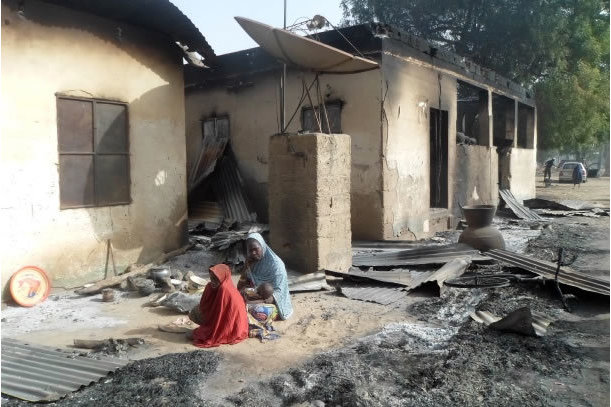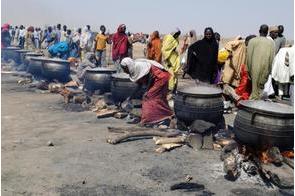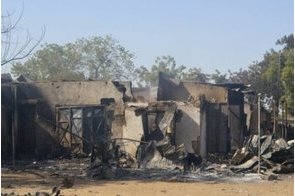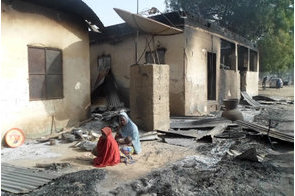Latest News
Nigeria records 39.1 per cent decrease in terror-related deaths

News Highlight
Despite the overall decline in terrorism in Nigeria last year, the country was ranked as the third most impacted country in the world by terrorism.
The 2020 Global Terrorism Index (GTI) published on Wednesday by the Sydney-headquartered Institute for Economics and Peace (IEP) shows an overall decline in terrorism in Nigeria. Terror-related incidents in the country fell by 27 per cent in 2019, representing the lowest level of terrorist violence in Nigeria since 2011.
The report also shows terrorism deaths in Nigeria fell to 1,245 last year, a 39 per cent decrease from the 2,043 deaths recorded in 2018. The decline in terrorism incidents and deaths in the country was attributed to a significant reduction in violence by armed Fulani herdsmen.
While the armed herdsmen were responsible for majority of terror-related deaths in 2018, the latest GTI report shows a 72 per cent decline in fatalities attributed to the herdsmen last year. In 2019, Boko Haram was the deadliest terrorist group in Nigeria, following a period of steady decline. Globally, the Islamist group ranked as the second deadliest terrorist group last year, after the Taliban in Afghanistan.
“Terror-related deaths and incidents attributed to Boko Haram in Nigeria increased by 25 and 30 per cent respectively from the prior year,” the IEP wrote in the new report. “Over the past year Boko Haram increased attacks on military targets, with deaths rising from 26 in 2018 to 148 in 2019.”
The Islamic State of Iraq and the Levant (ISIL) and Al-Shabaab – a Salafist militant group active in East Africa – were the world's third and fourth deadliest terrorist organisations, respectively, in 2019.
Despite the overall decline in terrorism in Nigeria last year, the country was ranked as the third most impacted country in the world by terrorism. Nigeria has maintained that position for five consecutive years since 2015. According to the latest annual GTI report, Afghanistan and Iraq are respectively the first and second most affected countries by terrorism.
Globally, deaths from terrorism fell in 2019 to 13,826. This represents a 15 per cent decrease from the previous year and the fifth consecutive year of decline since peaking in 2014. Nigeria recorded the second largest reduction in deaths from terrorism in 2019. The largest decreases in deaths occurred in Afghanistan.
Ten countries accounted for over 80 per cent of all deaths from terrorism in 2019. Nigeria accounted for 9 per cent of the global deaths while Afghanistan accounted for 41 per cent. The remaining eight countries were Burkina Faso, Mali, Somalia, Niger, Iraq, Democratic Republic of Congo, Yemen, Syria and Mozambique. The 2020 GTI report says conflict remains the primary driver of terrorism, with over 96 per cent of deaths from terrorism in 2019 occurring in countries already in conflict.
In terms of the economic impact of terrorism, the cost of terrorism experienced in Nigeria also declined from 2.7 per cent of gross domestic product (GDP) in 2018 to 2.4 per cent last year. By contrast, the economic impact of terrorism in Afghanistan was the equivalent of 16.7 per cent of GDP, while Syria had the second highest at 3.4 per cent of GDP.
Globally, the report estimates the economic impact of violence – including military, homicide, incarceration and terrorism – to be $14.5 trillion in 2019. This is the equivalent of 10.6 per cent of global GDP. The global economic impact of terrorism alone was estimated to be $26.4 billion last year.
The report warned that new threats of terrorism have emerged. For North America, Western Europe, and Oceania, the threat of far-right political terrorism has been rising over the past five years. A statement released by the IEP said there were 89 deaths attributed to far-right terrorists in 2019. Extended economic downturn caused by the COVID-19 pandemic is also seen as likely to increase political instability and violence.
"Between 2011 and 2019, riots and violent demonstrations in the West increased by 277 per cent," said Thomas Morgan, Senior Research Fellow at IEP. "There are serious concerns that the deteriorating economic conditions will lead to more people becoming alienated and susceptible to extremist propaganda."
The GTI, now in its eighth year, ranks 163 countries according to how impacted they are by terrorism. The indicators used by the GTI include the number of terrorist incidents, fatalities, injuries and property damage.
Related News
Latest Blogs
- Assessing the National Policy on Marine and Blue Economy
- When the intent of taxation reset diverges from its execution
- Towards healthcare system that protects patients and is fair to practitioners
- Outlook on 2026 global remittances and Nigeria
- Putting food at the centre of Nigeria’s health reform
Most Popular News
- Artificial intelligence can help to reduce youth unemployment in Africa – ...
- Grene Capital spins out of Actis as independent real asset fund manager
- NDIC pledges support towards financial system stability
- Cairo events focus on Africa’s asset integrity and cybersecurity
- Afreximbank ends its credit rating relationship with Fitch
- Global job quality stagnates despite resilient growth – ILO









